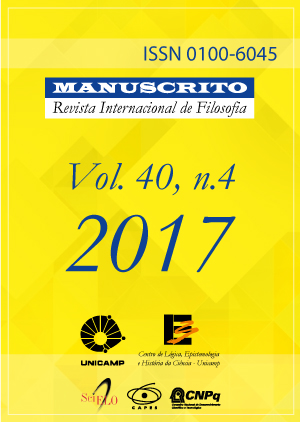Resumen
Timothy Williamson offers the ordinary practice, the lottery and the Moorean argument for the ‘knowledge account’ that assertion is the only speech-act that is governed by the single rule that one must know its content. I show that these fail to support it and that the emptiness of the knowledge account renders mysterious why breaking the knowledge rule should be a source of criticism. I argue that focussing exclusively on the sincerity of the speech-act of letting one know engenders a category mistake about the nature of constraints on assertion. After giving an analysis of assertion I propose that the norm of a type of assertion is the epistemic state one needs for one’s speech-act to succeed in being an assertion of that type and that the epistemic state in question is determined by the point of the type of assertion. One is practically irrational in violating the norm.Citas
Baldwin, T. G.E. Moore. London: Routledge, 1990.
Benton, M. A. Two More for the Knowledge Account of Assertion. Analysis 71: 684 – 687, 2011.
Benton, M. A. Assertion, Knowledge and Predictions. Analysis 72: 102–105, 2012.
Blauuw, M. Reinforcing the Knowledge Account of Assertion. Analysis 72: 105–108, 2012.
Brown, J. Knowledge and Assertion. Philosophy and Phenomenological Research 81: 549–566, 2010.
Cappelen, H. Against Assertion. In Assertion: New Philosophical Essays. Eds, J. Brown and H. Cappelen. Oxford: Oxford University Press. 21–48, 2011.
DeRose, K. 2002. Assertion, Knowledge, and Context. Philosophical Review 111:167–203.
Douven, I. Assertion, Knowledge, and Rational Credibility. The Philosophical Review ,115: 449–485, 2006.
Grice, H. P.Studies in the Way of Words. Cambridge, Mass.: Harvard University Press, 1989.
Hill, S. and Schechter, J. Hawthorne’s Lottery Puzzle and the Nature of Belief. Philosophical Issues 17: 102–122, 2007.
Jones, O. R. Moore’s Paradox, Assertion and Knowledge. Analysis 51: 183–186, 1991.
Kvanvig, J. L. Assertion, Knowledge, and Lotteries. In Williamson on Knowledge. Eds., 2009 D. Pritchard and P. Greenough: Oxford: Oxford University Press. 140–160.
Lackey, J. Norms of Assertion. Nous 41: 594–623, 2007.
Lackey, J. Learning from Words. Oxford: Oxford University Press, 2008.
Luther, M. D. Martin Luther’s Werke: kritische Gesamtausgabe (Weimarer Ausgabe). Weimar: H. Böhlau, 1883.
Maitra I, and Weatherson, B. Assertion, Knowledge and Action. Philosophical Studies 149: 99–118, 2010.
McKinnon R. and Turri J. Irksome Assertions. Philosophical Studies 166: 123– 128, 2013.
Moore, G. E. A Reply to My Critics. In P. Schilpp (Ed.), The Philosophy of G.E., Moore. Evanston: Northwestern University Press. 535–667, 1942.
Moore, G. E. Russell’s Theory of Descriptions. In P. Schilpp (Ed.), The Philosophy of Bertrand Russell. La Salle, Ill: Open Court. 175–225, 1944.
Moore, G. E. Commonplace Book: 1919-1953. London: George Allen & Unwin, 1962.
Rosenthal, D. Self-knowledge and Moore’s Paradox. Philosophical Studies 77: 195–209, 1995.
Rosenthal, D. Expressing One’s Mind. Acta Analytica 25: 21–34, 2010.
Slote, M. A. Assertion and Belief. In J. Dancy (Ed.), Papers on Language and Logic,. Keele: Keele University Library. 177–190, 1979.
Sorensen, R. A. 1988. Blindspots. Oxford: Clarendon Press.
Turri, J. Prompting Challenges. Analysis 70: 456–462, 2010.
Turri, J. The Express Knowledge Account of Assertion. Australasian Journal of Philosophy 89: 37–45, 2011.
Turri, J. Knowledge and the Norm of Assertion: A Simple Test. Synthese 192: 385 – 392, 2015. Unger, P. Ignorance: The Case for Skepticism. Oxford: Clarendon Press, 1975.
Weiner, M. Must We Know What We Say? Philosophical Review 114: 227–51, 2005.
Welbourne, M. More on Moore. Analysis 52: 237–241, 1992.
Williams, J. N. Moore’s Paradox – One or Two? Analysis 39: 141–2, 1979.
Williams, J. N. Moorean Absurdity and the Intentional ‘Structure’ of Assertion. Analysis 54: 160–66, 1994.
Williams, J. N. Moore’s Paradox, Defective Interpretation, Justified Belief and Conscious Belief. Theoria 76: 211–248, 2010.
Williams, J. N. Moore’s Paradox and the Priority of Belief Thesis. Philosophical Studies 165: 1117–1138, 2013.
Williams, J. N. Not Knowing You Know: A New Objection to the Defeasibility Theory of Knowledge’ Analysis 75: 213–217, 2015.
Williamson, T. Knowledge and Its Limits. Oxford: Oxford University Press, 2000.
Wittgenstein, L. Remarks on the Philosophy of Psychology volume 2. G.H. von Wright and H. Hyman (eds.). University of Chicago Press, Chicago, 1980.

